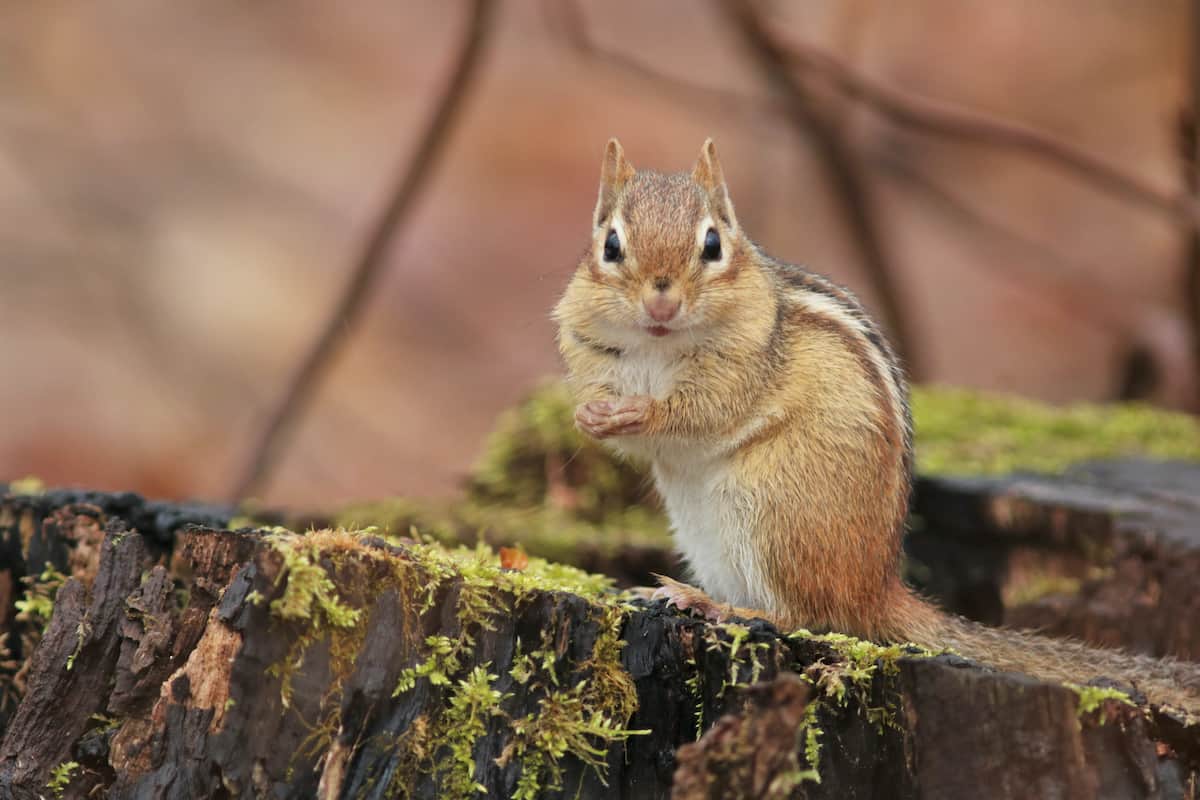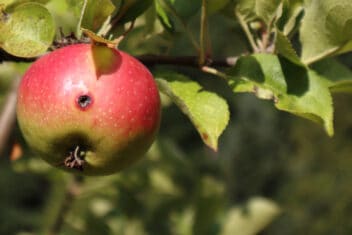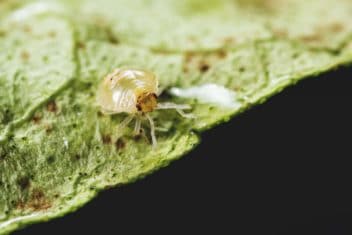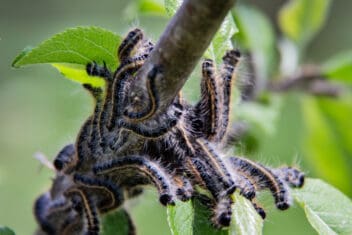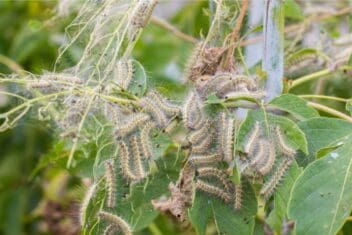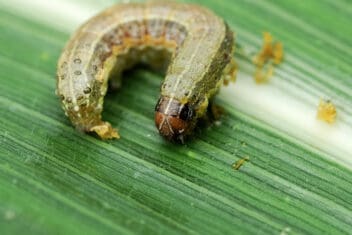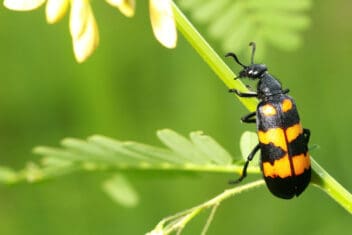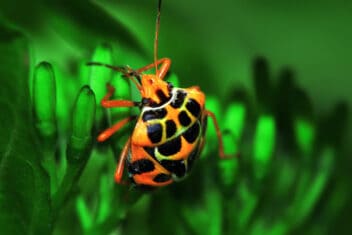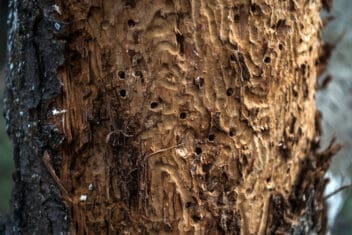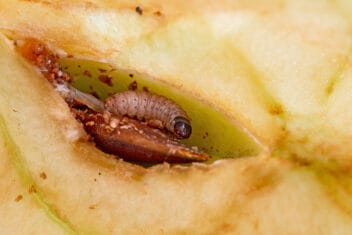Chipmunks are cute and tiny, but they can cause considerable damage to your garden. After all, Chip and Dale were adorable, but they drove Donald Duck crazy!
Chipmunks mostly forage on the ground and they aren’t afraid to sneak some of the seedlings and grains from your garden. They can also climb trees to harvest nuts and fruits.
On top of that, they’re diggers and live in burrows in the ground, which can be frustrating when they make your garden their new home.
Here’s how to encourage them to leave your garden alone.
Why Chipmunks Are a Problem in the Garden
Chipmunks are small striped rodents that are related to squirrels. They eat a wide variety of foods including seeds, nuts, fungi, and fruits. In your garden, they especially enjoy grains such as wheat, sunflowers, newly planted seeds, and seedlings under four inches tall.
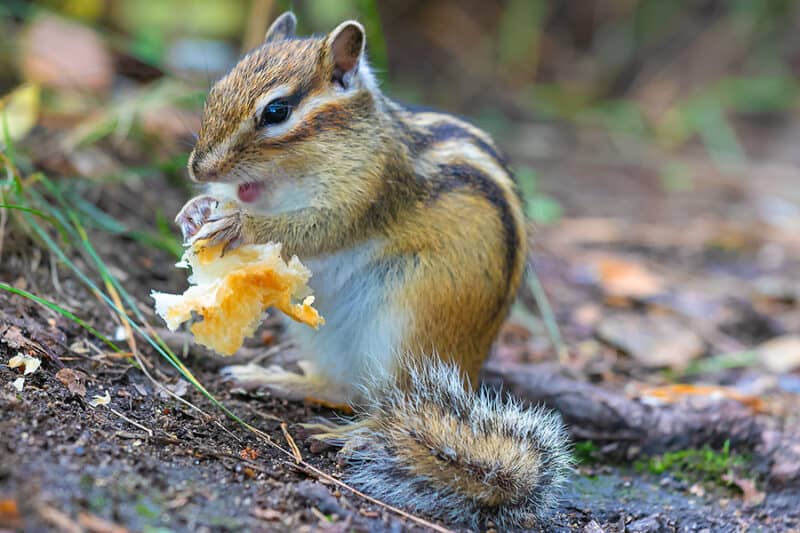
Beyond eating your plants, one of the ways squirrels can cause problems is by digging in your garden. They live in underground burrows and also dig to look for food. This can be especially bothersome during spring planting.
A squirrel burrow may extend 20-30 feet. They don’t have a mound of dirt at the opening of the hole like moles do. Chipmunks remove the dirt and scatter it away from the den.
Their burrows can also damage the roots of the plants in your garden. Chipmunks in the lawn aren’t as problematic since the grass is more resilient.
Chipmunks – like squirrels – are important to forest ecosystems. Their hoarding behavior helps to disperse seeds and spores that become new plants. This helps keep the forest ecosystem diverse.
Our goal is to keep them away from the plants we want to protect while letting them perform their function in the ecosystem.
6 Humane Deterrents
There are several techniques you can try to keep chipmunks out of the garden. It may be most effective to use several of these at once. If you find one doesn’t work, try something else.
1. Chicken Wire
Chipmunks aren’t as damaging to gardens as other mammals like deer and rabbits, but they can still cause a serious problem, especially if you have some valuable plants.
If that’s the case, you may want to build a cage around your most important plants.
We have advised using netting to protect your gardens from marauding squirrels and hungry birds. However, netting is only partially effective with chipmunks. Chipmunks are efficient diggers and chewers and will do both to get through netting.
Chicken wire may be a better answer to chipmunk invasions – or better yet, hardware cloth. The small holes and welded wire of hardware cloth make it impervious to chipmunks.
You need to bury the fencing underground before planting and build four walls plus a roof around the plants you want to protect.
Fencing should be buried at least six inches underground. Since chipmunks can climb, the fence should be six feet tall and have some netting over the top.
You can have a shorter fence of hardware cloth and then have it angle out at the top to discourage them from climbing over. Chipmunks are not quite as agile when it comes to climbing as their cousins the squirrels.
2. Some Like It Hot
Fortunately, chipmunks don’t like hot spices or strong smells such as chili powder and cayenne pepper. You can buy these in quantity at any large grocery.
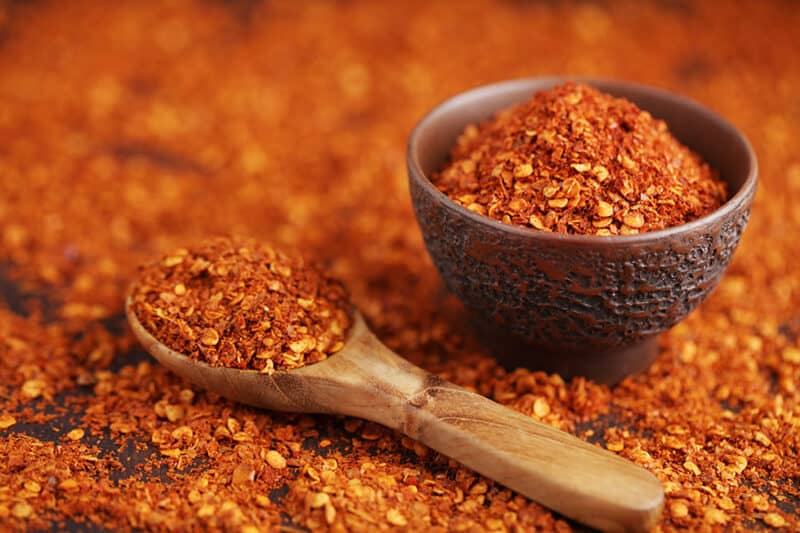
Simply sprinkle the spices on the ground around your plants. The chipmunks will be offended by the smell and won’t want to walk on the hot spices. Remember you will need to replace the spices every time it rains.
Castor oil is stinky stuff. The liquid soaks into the ground and makes it unpleasant for the chipmunks. You can find it in your local pharmacy or it is also sold as a mole repellent – another animal who likes to dig.
Garlic spray is also recommended by some people, however, I have never had good luck with using garlic. The key may be to mix garlic and hot peppers together.
One extension agent suggested adding one clove of garlic and one jalapeno pepper in a blender with four cups of water. Chop the mixture and let sit for thirty minutes.
Then strain out the pulp and place the liquid in a spray bottle. Add a drop of liquid dishwashing soap and a teaspoon of vegetable oil. These will help the solution stick to the plants.
Shake well. Spray this mixture on your plants.
3. Motion Activated Water Spray
Motion-activated water spray guns do a good job of scaring chipmunks away from garden areas. You just hook them up to a hose. These machines are equipped with a motion sensor that detects the chipmunk and quickly sends out a spray of water.
Some even make loud noises. Chipmunks are frightened and deterred by the water blast and sound. Basically, they move on because their life is unpleasant.
Keep in mind that the motion sensor doesn’t know if it senses a chipmunk or your family pet. Also, your children may think its fun to set them off on a hot day!
4. Fake Predators
Motion sensors or even still animal models can also make good deterrents. Fake snakes placed on the ground near burrows can scare the chipmunk family away.
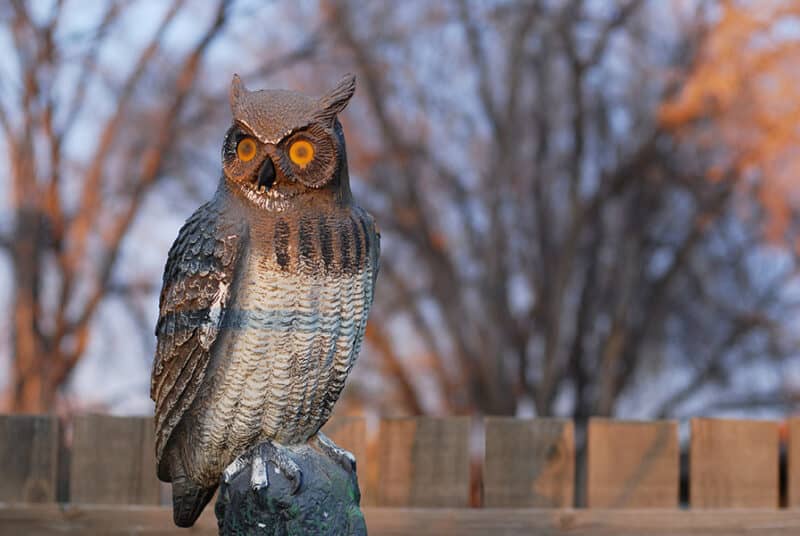
Owls also make good decoys. Place them about four feet high overlooking the garden area. Remember that fake animals only work if you move them every few days. The chipmunks will realize that they are not real if they stay motionless.
Some of the fake animals come with battery-operated movement and have the ability to make sounds. This makes them more lifelike but you still need to move them around the garden.
5. Predator Urine
You can purchase fox urine to sprinkle around your garden beds. Foxes are natural predators of chipmunks. Keep in mind that you may find this smell unpleasant as well.
Make sure you get predator urine that states it was gathered under humane circumstances. These are usually collected at zoos or other places regulated for wild animals.
Some people feel that deer repellent, which often smells of rotten eggs, works well. I have never tried it but they don’t like strong odors so it makes sense.
6. Cat Hair
Another method, if you have an inside cat, is to sprinkle cat hair around the garden. Just give your furry friend a nice brushing and scatter the hair around where you have observed chipmunks.
Some Deterrents Not To Use
There are a few common deterrents that people sometimes recommend that I’d encourage you to avoid.
Mothballs
Mothballs have a big following in deterring pests but there are two problems with their use.
One is that they don’t work very well. In an open space, their smell deteriorates quickly.
The second problem is that aren’t a safe, organic method. The chemical in mothballs is called naphthalene. It is a fossil fuel product obtained from off-gassing of crude oil and coal tar.
Naphthalene is used in insecticides and has proven harmful to human health. It can cause neurological and liver damage as well as cataracts. It is not allowed in organic agriculture practices.
Snap Traps
Snap traps like those often used on mice are inhumane. The chipmunks are doing what comes naturally. Snap traps often cause long painful deaths.
In addition, when wild populations are caught and killed that sends a signal to the rest of the community. The signal is breed now.
Many wild animals will react to a lowered population with additional mating. There way of keeping the species from going extinct.
7. Make Landscaping Work for You
Chipmunks don’t like open spaces. If you use an open landscaping plan you can naturally deter them.
Wood piles and stone walls provide hiding places for chipmunks and other small animals. Keep these away from your garden.
In the fall rake up fallen leaves and compost them.
A Few Specific Situations You May Need to Deal With
Chipmunks may target specific areas of your property. Here are some strategies to protect them.
Protecting Container Gardens
Chipmunks love container gardens and raised beds. These types of gardens make the chipmunks feel safe since they’re off the ground and not in the open. The chipmunk can hide away in the foliage.
To help deter them from digging in your containers cut and place wire mesh along the top of the soil. Secure with garden staples. Your plants can grow through the mesh but it deters digging.
There are several plants that are considered chipmunk resistant. Plant these in your beds. For landscaping flowers, plant bluebells, iris, bee balm, black-eyed Susan, phlox, sedum, and alliums. They’re all unpopular with chipmunks.
Herbs that chipmunks don’t like include yarrow, catmint, echinacea, hyssop, chives, and lavender.
Keep Those Fall Bulbs Safe
Chipmunks love tulips. Daffodils are pretty resistant but tulips are dessert food. There are several ways of protecting your fall bulbs.
You can purchase a wire basket or plastic container made for bulbs. Place them in the ground with the bulbs inside. This works with small plantings but gets pricey in a bigger area.
When planting tulips in a large area, dig a long trench and line in with hardware cloth on the bottom and the sides. Then put dirt in the bottom, plant your bulbs at the desired depth and cover with soil.
On top of the soil put down another piece of hardware cloth to keep them from digging at the top. In the spring when the tulips sprout you can remove the top layer so they can grow.
Another trick is to plant tulips and daffodils together. The smell and taste of the daffodils are unpleasant and the chipmunks may avoid the bed.
Find Harmony in the Garden
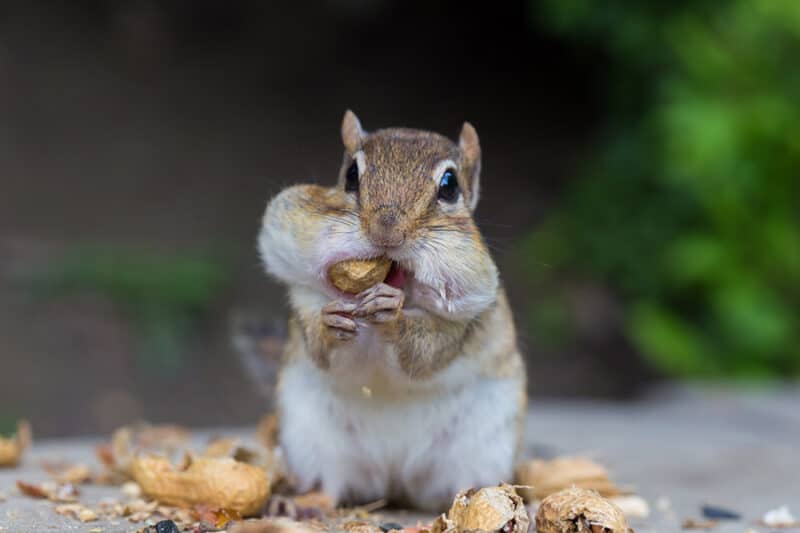
In the big picture, chipmunks are small and don’t do as much damage as larger wildlife such as deer. You can often manage them with strong smells and noise.
Keep in mind the chipmunks are just doing what comes naturally, looking for food for their families, and they aren’t deliberately trying to ruin your gardens!
